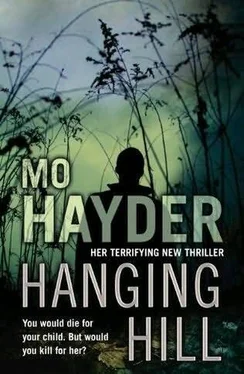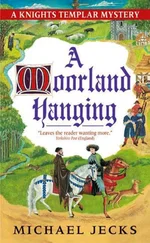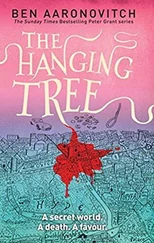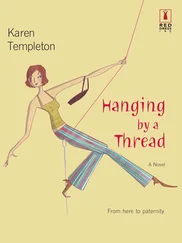The Woods’ house was set in gardens that rambled for almost an acre up from the canal towpath. The narrow driveway led through an imposing grove of redwood trees, with well-tended lawns stretching away on either side, then clusters of outbuildings and greenhouses. A ride-on mower sat in the sun and a wheelbarrow full of dead bindweed had been abandoned on the hard-standing. The house itself was comparatively small and unprepossessing – a thirties pebble-dashed box, neat and well maintained but unimaginative. A uPVC conservatory had been added at the back, inside which sat floral armchairs and a dining table covered with a white linen tablecloth.
Zoë parked and walked around the side of the house. The liaison officer the family had been assigned had warned the Woods of Zoë’s visit. He’d told them she had no news, that she was coming to ask questions, so they wouldn’t all gather to stare expectantly at her. Lorne’s father was in the garden and didn’t even look up when she passed. He wore a swagman’s hat, complete with dangling corks, a Singha beer T-shirt, and shorts. He was using a chainsaw to cut a felled birch into logs, and although he must have seen her, he kept his back turned to the house. According to the paperwork he was a project manager in the construction business. Zoë guessed he wasn’t of the right social stratum to be down the boozer mounting posses to lynch whoever it was who’d killed his daughter. But he’d be picturing it nevertheless. He’d be having intellectual arguments with himself, huge battles of reason, about the role and logic of the justice system. About forgiveness and humanity. He’d be cutting the log and imagining it was Lorne’s killer he was hacking into.
From the patio bench a tall, sorrowful-looking lad watched her approach. He sat with his elbows on his knees and was jiggling slightly, as if he was ready to jump up at any moment. He had a shock of sandy hair, and the chinos and sweatshirt he wore seemed to have been slept in. This must be Lorne’s brother, driven home overnight from his university in Durham. He gave her an embarrassed nod, held up his hand to indicate the front door, then went back to his nervous jiggling.
The door was open a crack. Zoë pushed it further and found herself in a hallway filled with framed photos. Horse photos: gymkhanas, ponies clearing jumps, difficult ones – triple oxers and cross-country walls. A young Lorne grinning from under a riding hat, arms round the neck of a black pony, its browband bristling with rosettes.
‘Hello?’
‘In here,’ came a voice from the end of the corridor. Zoë continued on and found, in the kitchen, the liaison officer sitting hunched over a computer, and Mrs Wood, standing at the worktop, scratching furiously in a small notebook. She was dressed in corduroy trousers and a Joules Elephant Polo T-shirt, a mass of curly hair tied back from her face. The moment she turned to face her Zoë noted two things. The first was that Mrs Philippa Wood had once been Miss Philippa Snow and had been at Zoë’s boarding-school nearly twenty years ago. The second was that Mrs Wood really hadn’t accepted her daughter was dead. She was smiling grimly, a pragmatic expression on her face, as if she was determined to get through this visit from the police as soon as possible.
‘Pippa Wood.’ She gave Zoë’s hand a firm shake. If she recognized her she didn’t say anything. ‘Coffee? It’ll take just a moment.’
Zoë exchanged a glance with the liaison officer, who gave a slow nod, as if to say, ‘I told you so. It hasn’t reached her yet.’
‘Please. Black, with two sugars.’ She folded her arms and leaned against the counter top, watching her switch on the kettle and get down mugs from the cupboards. ‘I know you spoke to the police yesterday, Mrs Wood, and the day before that when Lorne went missing. I don’t want you to think we’re hassling you. I just wanted to see if anything had come up for you overnight. Anything you recalled – anything in your statement you wanted to change or add to.’
‘Not really.’ She held out an opened biscuit tin containing brownies and sponge fingers. Zoë hadn’t seen sponge fingers in years. She took one. Pippa snapped the lid back on. ‘She got home from school at one – they do a half-day on Saturday. She got changed and went into town. Completely normal.’
‘She did that often?’
‘Yes. She liked to go shopping. Some of the places in the centre stay open till six, even later.’
‘And she didn’t say she was meeting anyone?’
‘No.’ She got milk from the fridge. ‘She liked to be on her own.’
‘What was she shopping for?’
‘The usual. Clothes. Window-shopping, of course, because I don’t let her have money just to waste. She thought she was going to London to be a model – any money I’d given her she’d have squandered on that pipedream. We’re trying to teach her the value of money, what’s a sensible spend and what isn’t, but with Lorne, it’s in one ear and out the other. Her brother, on the other hand…’ She shook her head, as if life was a mystery to her. ‘Isn’t it amazing how two children, the same genes, can turn out so differently?’
‘What’s a “sensible” spend?’
Pippa scrutinized Zoë, as if she was wondering whether this was a trick question. ‘Well, not clothes, of course. At least, not the sort of clothes she wants. Something practical, maybe.’ She gave the leg of her own trousers a shake as an illustration. ‘But not these things she goes for, covered in glitter – they fall apart after one wash.’
At school Zoë and Pippa had been in different years, but now Zoë was remembering something of her reputation. Super sporty, captain of the hockey team, crazy about horses. And as hard as nails.
‘Did she have a horse?’
‘Not any longer. She did have, but she wouldn’t look after him. I’d have kept him, but I didn’t send him out to be broken in, did it myself, so he was never going to be happy with me on his back and he was too small, anyway. Now it’s just the mare and the five-year-old.’
Zoë nibbled thoughtfully at the sponge finger, her hand cupped under it so as not to drop the sugar crusting on the kitchen floor. There had been a time years ago when she’d done a routine enquiry on a twelve-year-old girl who’d been thrown and trampled by her horse, and was lying in a coma in Intensive Care. The mother had been in tears during the interview. But in tears for what might happen to the horse, not to her daughter. All that came out of her mouth was: ‘It wasn’t his fault. He got scared – she shouldn’t have had him on the road. It wasn’t his fault.’ Zoë licked her fingers carefully, then leaned a little way out of the kitchen door and peered at the staircase. ‘Is her room up there?’
‘There’ve been some teams in it already. They took her computer. They left about an hour ago.’
‘Could I have a look?’
‘Of course you can. You’ll forgive me if I don’t come with you.’
Zoë carried the coffee into the hallway and went slowly up the stairs, past all the gymkhana photos. It stuck in her head, that line: Any money I’d given her she’d have squandered on that pipedream . It was years since she’d been living at home with her parents, and all the pain that had entailed, but the memory came back to her as sharp as cold air. Never quite measuring up. Wanting nothing more than to escape.
Lorne’s room – with a poster of the Sugababes Blu-tacked on the door – was opposite the top of the stairs, next to the family bathroom. The persistent buzz of Mr Wood’s chainsaw was more muffled here. Zoë pushed opened the door, went inside and stood for a while, taking in the room.
Lorne had been privileged – Faulkener’s would have set the Woods back twelve to fifteen grand a year, probably, and here there were little giveaways of her lifestyle that pinned her as a cut above the ordinary: a framed photo of her in front of the Sydney Opera House, another of her dressed in a strapless ballgown, débutante smile on her face, age all of thirteen, Zoë guessed. Aside from that, what was most distressing about the room was its sheer normality. Exactly the sort of teenage girl’s bedroom that would be replicated in hundreds of other homes across Bath. No pictures of horses; instead it was posters of girl bands dressed in what looked like lingerie. On the wall next to the window a corkboard was covered with photos – Lorne pictured on a climbing wall, tongue out to the camera, delighted grin on her face; Lorne with three other girls crammed into a photo booth; Lorne in a floaty white dress, a flower circlet on her ankle; Lorne in a strawberry-design swimsuit – the epitome of every teenage boy’s fantasy. Her hair changed too, from one shot to the next, from bright blonde, cut in a fringe, to Goth, sullen black, complete with a magenta streak in the fringe. Zoë wondered how that had gone down at Faulkener’s School. At her boarding-school hair dye would have been an expellable offence, but that school’s speciality had been turning out no-nonsense girls. Like her. And like Pippa Wood downstairs.
Читать дальше












